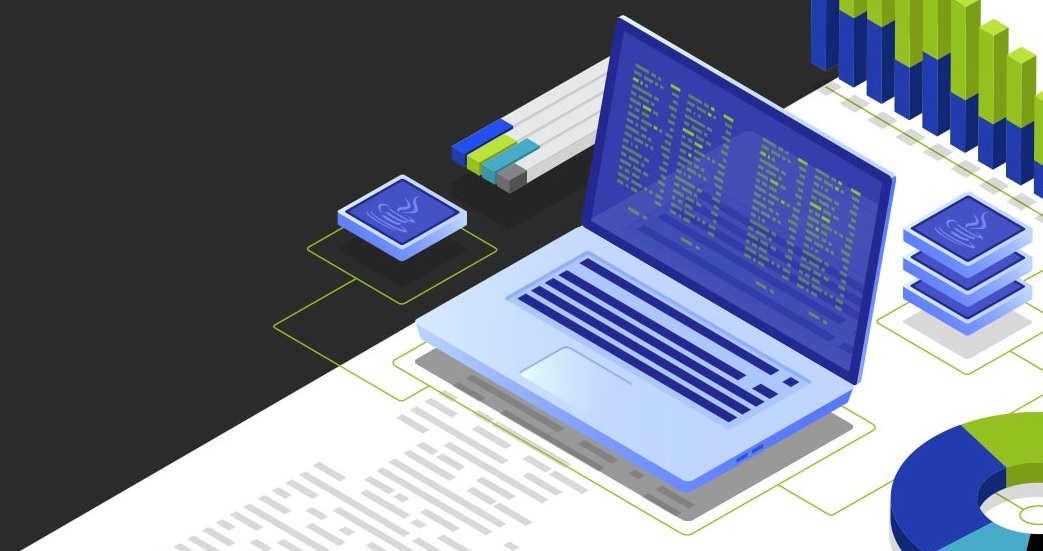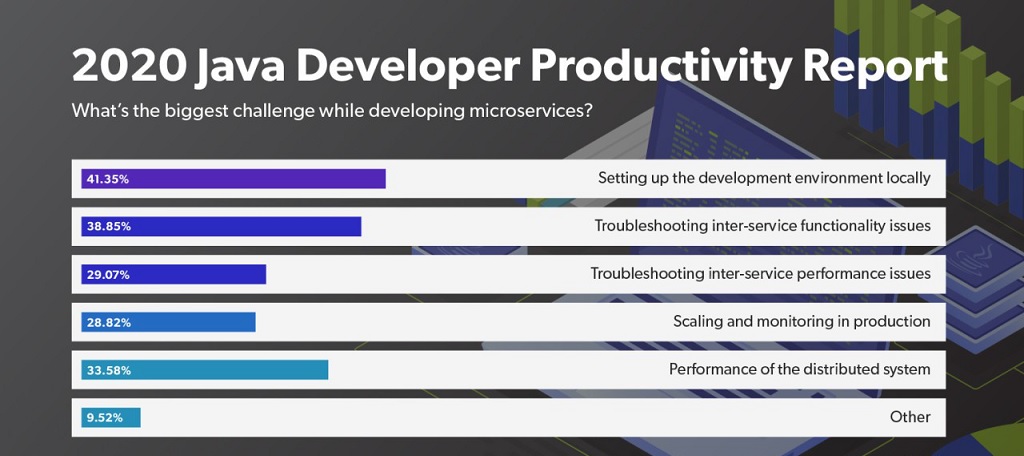LambdaTest announced its partnership with Assembla, a cloud-based platform for version control and project management.
The 2020 Java Developer Productivity Report, carried out by Perforce Software, received detailed responses from nearly 400 Java development professionals (with 74% identifying themselves as developers) worldwide. If there was one message that stood out loud and clear it was this: microservices are growing fast, but bring considerable new challenges for developers.

Microservices Adoption
The survey found over 50% of respondents already using microservices, with 28% still working in the monolith environment. 10% reported working in SOA-based architectures, with the remainder spread across desktop, mobile, and serverless application architectures.
Nearly two-thirds of respondents reported working in, or in the process of transitioning to microservices, with a further 21% considering microservices adoption. That means a combined 85% of those surveyed are working with, or considering, microservices for their current project.
Challenges With Microservices
Microservices adoption may have outpaced expectations, but this architectural sea-change carries new challenges for application performance.
Performance issues were the biggest challenge cited by survey respondents, with 29% experiencing problems trouble-shooting inter-service performance, and 33% experiencing performance issues in the overall distributed system. The top performance issue reported by 55% of respondents was slow application response time, followed by memory leaks at 28% and excessive open connections at 24%.
The next biggest issue reported was setting up the local development environment, at 41%, due to this being an intricate, difficult and time-intensive process. This was closely followed by trouble-shooting of inter-service functionality (38.85%).
One prominent concern for developers was their visibility into how their microservices work together as a system. Developers rated their satisfaction with code visibility at only six out of ten.

New Architecture, New and Old Problems
Beyond microservices, at 70%, developers are being asked to have far greater responsibility for application performance. Over half reported non-functional performance goals, which, in practice, means they are carrying out more application performance tests, but often without full insight into how their code is impacting the rest of the application.
This may be a contributing factor to why the survey also found that over 78% of teams had issues that reached production stage in the previous 12 months, though only 17% said that had happened regularly. The good news is the 21% who did not experience issues escaping into production.
Redeploys are another pain point for developers. With the average Java developer reportedly deploying code ten times per day, lengthy redeploys can cause significant roadblocks during development. In fact, almost half of all the survey respondents reported over four minutes per redeploy. (This is despite the widespread adoption of microservices, which were expected to decrease redeploy times.) A further third experience redeploy times of between two and three minutes, with only 20% fortunate enough to experience just one minute per redeploy.
Microservices Technologies
With an average satisfaction rating of six out of ten, most developers were above satisfied with available microservices troubleshooting technologies. 72% of developers reported ratings of satisfied and above, with the remaining 28% less than satisfied with available troubleshooting options.
The popularity of microservices-ready (or requisite) technologies like Docker, Spring Boot and IntelliJ IDEA showed the impact of microservices on the Java development technology landscape. Spring Boot claimed the title for most popular runtime platform at over 80% use, while IntelliJ IDEA led IDE usage at over 81%. Docker, now synonymous with microservices, led virtualization tools usage at over 70%. Kubernetes (often used alongside Docker) represented 35% usage, while VMware and Vagrant followed with 17% and 4% usage, respectively.
Looking Forward
While tools and technologies quickly evolve to supply the means of widespread innovation, developers still face many of the same issues.
Will new innovations solve these perennial issues? Perhaps the focus for the next decade needs to be more on how to empower developers to automate, remove, and streamline tasks for these increasingly complex applications.
Industry News
Salt Security unveiled Salt Illuminate, a platform that redefines how organizations adopt API security.
Workday announced a new unified, AI developer toolset to bring the power of Workday Illuminate directly into the hands of customer and partner developers, enabling them to easily customize and connect AI apps and agents on the Workday platform.
Pegasystems introduced Pega Agentic Process Fabric™, a service that orchestrates all AI agents and systems across an open agentic network for more reliable and accurate automation.
Fivetran announced that its Connector SDK now supports custom connectors for any data source.
Copado announced that Copado Robotic Testing is available in AWS Marketplace, a digital catalog with thousands of software listings from independent software vendors that make it easy to find, test, buy, and deploy software that runs on Amazon Web Services (AWS).
Check Point® Software Technologies Ltd.(link is external) announced major advancements to its family of Quantum Force Security Gateways(link is external).
Sauce Labs announced the general availability of iOS 18 testing on its Virtual Device Cloud (VDC).
Infragistics announced the launch of Infragistics Ultimate 25.1, the company's flagship UX and UI product.
CIQ announced the creation of its Open Source Program Office (OSPO).
Check Point® Software Technologies Ltd.(link is external) announced the launch of its next generation Quantum(link is external) Smart-1 Management Appliances, delivering 2X increase in managed gateways and up to 70% higher log rate, with AI-powered security tools designed to meet the demands of hybrid enterprises.
Salesforce and Informatica have entered into an agreement for Salesforce to acquire Informatica.
Red Hat and Google Cloud announced an expanded collaboration to advance AI for enterprise applications by uniting Red Hat’s open source technologies with Google Cloud’s purpose-built infrastructure and Google’s family of open models, Gemma.
Mirantis announced Mirantis k0rdent Enterprise and Mirantis k0rdent Virtualization, unifying infrastructure for AI, containerized, and VM-based workloads through a Kubernetes-native model, streamlining operations for high-performance AI pipelines, modern microservices, and legacy applications alike.
Snyk launched the Snyk AI Trust Platform, an AI-native agentic platform specifically built to secure and govern software development in the AI Era.




